Thailand - School based oral health programme for children in Southern Thailand
Thailand - School based oral health programme for children in Southern Thailand
Introduction
Few oral health programmes have targeted young school children in Thailand where oral health of the young children, particularly among the underprivileged, needs improvement.
An enhanced school oral health programme targeting children and parents was carried out in Southern Thailand (Songkhla Province).
Background
The national oral health survey conducted in 2012 showed 78.5% of the 5- year-olds to have caries and dmft 4.4, while in 3 year olds, 51.7% had caries with 2.7dmft. In addition, among the different regions in Thailand, Southern Thailand showed a high caries prevalence.

Therefore an enhanced school oral health programme was developed for Southern Thailand which included health promotion and oral health education for school children and their parents combined with supervised tooth brushing and effective fluoride toothpaste both in schools and home.
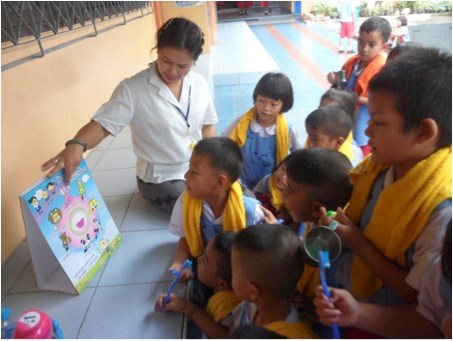
Programme outline
A total of 15 schools with 3,706 children initially aged 4-6 years, participated in this study. Seven schools with1940 children formed the intervention group while eight schools with 1766 children were the control group. The children were re-examined after two years of the study to assess the effect of the programme.
The programme involves engagement of schoolteachers who were responsible of the implementation of oral health activities in the schools.
Intervention
- The teachers of the study group received two workshops which trained them to provide oral health education to the children and their caregivers and to perform supervised tooth brushing.
- Children brushed their teeth after lunch in the schools under the supervision of teachers who had been specially trained.
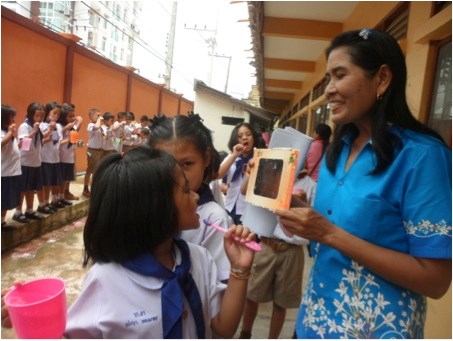
- Children brushed for two minutes with pea sized toothpaste and rinse with minimal amount of water and spit once.
- Toothbrushes and fluoridated toothpastes were provided to each child and kept at school. In addition, toothbrushes and pastes were given to each child to be used at home.
- The toothpaste used by the intervention group of children contained 1450 ppm fluoride and 1.5% arginine (arginine addition to the toothpaste improves the efficacy).
- Toothbrushes and toothpastes were given to the children at eight weeks intervals to be taken home
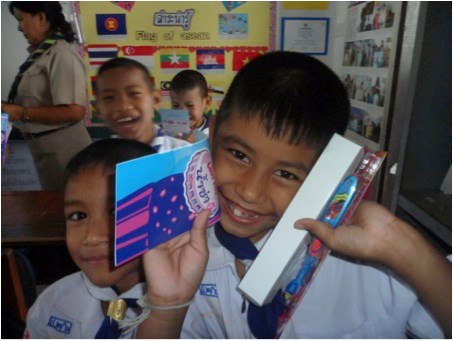
- Teachers provided oral health education four times a year.
- Teachers also communicated to the caregivers on how to improve children’s oral health, on a regular basis.
- Annually a brochure on oral health was sent to caregivers.
- During the two years, the research team monitored school activities twice a year.
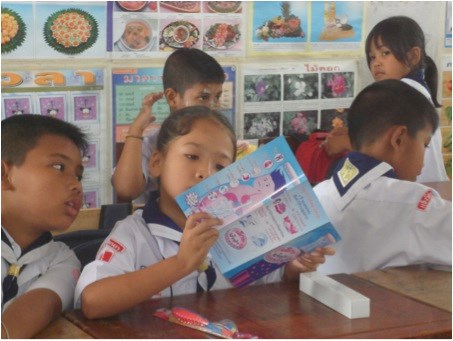
Control
- Children followed the policy of brushing teeth using fluoridated toothpaste (1000 ppm) after lunch at school.
- Tooth brushing was often unstructured with weak or no supervision by the teachers.
- This reflects the current practice in Southern Thailand.
Assessment
- A calibrated team of dentists assessed the programme by examining the children from the intervention and study groups before the study and after two years.
- Presence of caries dmft/DMFT and plaque were recorded accordingly.
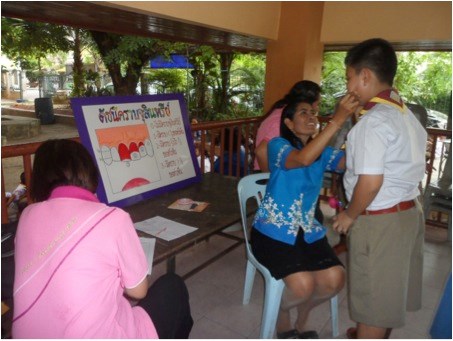
Achievements
- The DMFT and DMFS increments (enamel and dentine caries) were 1.19 and 1.91 for the control group and 1.04 and 1.59 for the intervention group representing 12.6% (DMFT) and 16.8% (DMFS) reduction in caries respectively.
- 'The DMFT and DMFS increments in dentine caries were 0.26 and 0.44 for the control group and 0.19 and 0.29 for the intervention group representing 26.9% and 34.1% reduction in caries respectively.
- Intervention schools were classified as cooperative and non-cooperative based on their participation in the programme. If at least 80% of children conducted tooth brushing according to the correct method, that school was called cooperative. In the more cooperative schools up to 40.9% reduction of dentine caries for DMFS.
- There was significant improvement of plaque scores in the intervention schools, greater in the cooperative schools.
Conclusion
Schools provide a unique platform for improving oral health of children in countries around the world. An enhanced oral health programme implemented in the schools in Southern Thailand seems to considerably impact on the caries experience in young children. The programme demonstrates the importance of usage of effective fluoride toothpaste and the value of engaging schoolteachers in health promotion and oral health education is significant.
Further reading
Jürgensen N, Petersen PE. Promoting oral health of children through schools – Results from a WHO global survey 2012. Community Dental Health 2013; 30: 204–219
This report is prepared for the “Bank of Ideas” by Stjernswärd J and Petersen PE based on the publication Petersen PE, Hunsrisakhun J, Thearmontree A, Pithpornchaiyakul S, Hintao J, Jürgensen N, Ellwood RP. School-based intervention for improving the oral health of children in southern Thailand. Community Dent Health. 2015;32:44-50
Special thanks
Thanks to Drs J Hunsrisakhun, A Thearmontree, S Pithpornchaiyakul, J Hintao and C Walee for having eased the photos illustrating the variety of project activities in schools. The authors thank the schools involved in the study. We are grateful to the team responsible of field intervention and acknowledge the valuable work of the examination teams. Finally, we are grateful to the Prince of Songkhla University Dental School administrative team for their tremendous effort in conducting this study.
Contact persons: Dr Jaranya Hunsrisakhun hjaranya@hotmail.com and Dr Angkana Thearmontree angkana.dent@gmail.com
